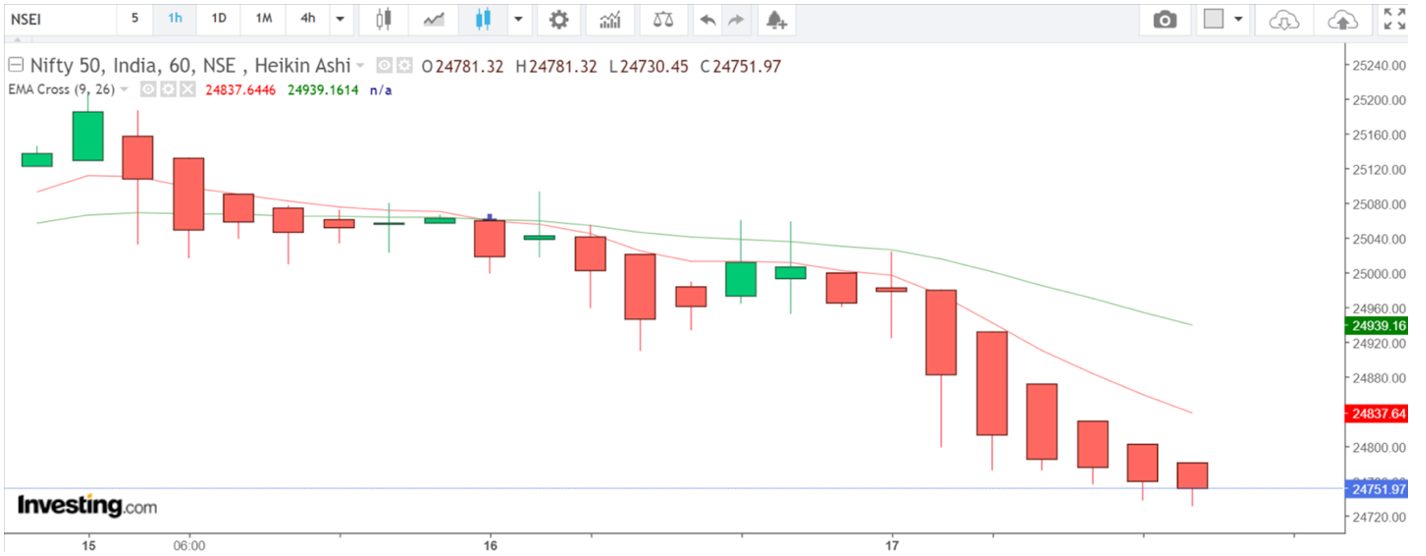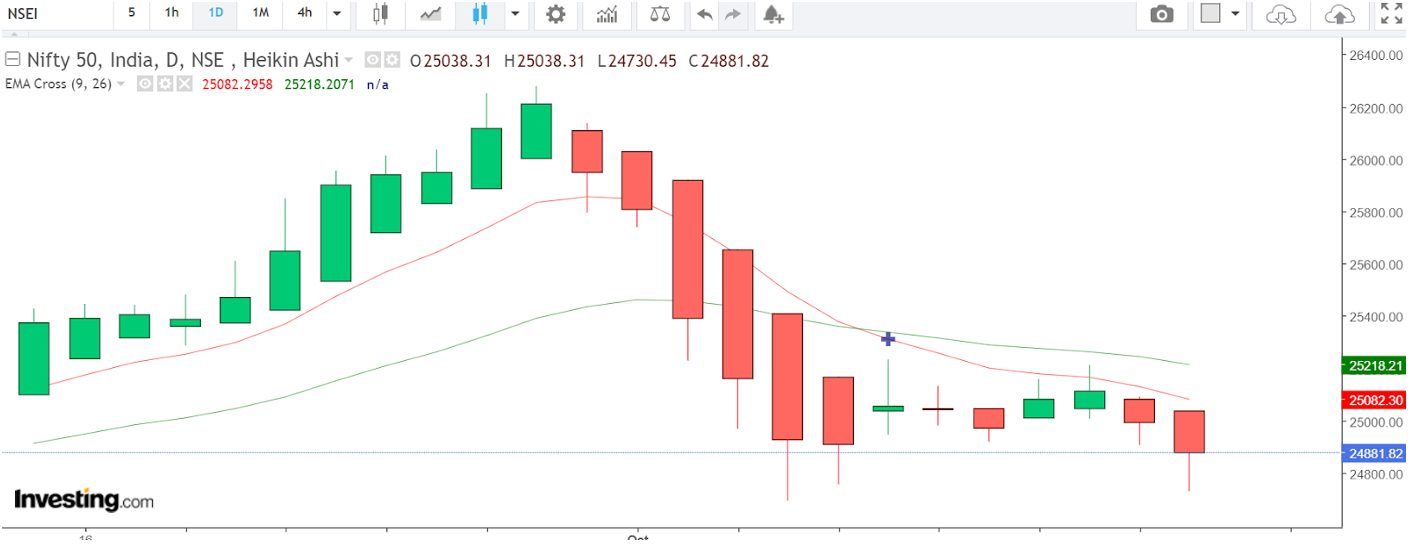CFD Trading In India



Contract for difference (CFD) trading is gaining popularity in India as investors look for flexible ways to access financial markets. Instead of purchasing an asset, you’re essentially betting on whether the price will rise or fall.
This offers a range of benefits, such as the ability to trade with leverage and the option to go long (buy) or short (sell), meaning you can profit from both rising and falling markets. However, you could lose any rupees you invest.
CFD trading is relatively new to Indian traders and a legal grey area which we’ll cover later. However, its potential for high returns and its accessibility through online platforms are catching the attention of many retail investors.
Want to start CFD trading in India? This beginner’s guide will help you decide if it fits your trading goals.
Quick Introduction
- With CFDs, you can tap into a range of Indian and global markets from a single platform. This means you can quickly diversify your portfolio and capitalize on opportunities worldwide.
- A key draw is leverage; you can control a larger position with less capital. With leverage of 1:10, you can trade a position worth INR 100,000 with just INR 10,000 of your own money.
- CFDs allow you to go both long (buy) and short (sell). This is particularly beneficial during periods of market volatility, where prices can move dramatically in either direction.
- You’re speculating on price movements without owning the asset. This means you don’t have to worry about issues like custody, storage, or dealing with brokers for physical purchases.
Best 4 CFD Brokers In India
Based on our hands-on tests, these 4 CFD trading platforms offer the best environment for traders in India:
How Does CFD Trading Work?
You enter into a contract with a broker to exchange the difference in the price of an asset, such as shares in Nestle India Ltd, between when you open and close the trade.
Leverage is a core component of CFD trading. It lets you open larger positions while committing a fraction of the total value or margin needed to, for example, buy the equivalent amount of shares in Nestle India Ltd.
To show you how it works, let’s look at a potential scenario using a CFD to trade a popular Indian index: NIFTY 50. This benchmark Indian stock market index represents the weighted average of 50 of the largest Indian companies listed on the National Stock Exchange.
If you’re convinced the NIFTY will rise, you’d buy a CFD position. If each contract is valued at INR 24,800, and your brokerage requires a 5% margin, then to take a position on 10 contracts, you’d need a margin of INR 12,400 (24,800 per contract x 10 contracts x 5%).
If the NIFTY goes up to 25,000, the price increase would yield INR 200 per contract. By closing your position, you could secure a total profit of INR 2,000 (10 contracts x INR 200), excluding broker fees.
Alternatively, if the index falls to 24,600, you would lose INR 2,000. This shows the risks involved with CFD trading; you get to control significant size with leverage, but gains and losses are increased.
Knowing how margin and leverage work is fundamental to your future success.If CFD trading is new to you, why not start with a demo trading account? It’s a great introduction to practice strategies and build confidence before you risk real rupees.
What Can I Trade?
CFD trading offers many trading opportunities across several financial markets, both in India and internationally:
- Stock CFDs – Trade individual Indian stocks listed on the NSE using CFDs without the extra expense of buying the shares.
- Index CFDs – The NIFTY 50 (NSEI) is India’s leading share market index. It is a market capitalization-weighted index of the top 50 listed companies on the NSE. Traders opt for index CFDs to capitalize on a stock exchange’s overall market performance rather than trade individual shares. Alternatively, why not consider CFDs on global indices like the Dow Jones, the NASDAQ, or the ASX. Liquidity is always high, and the trading costs are competitive.
- Forex CFDs – The Indian rupee, INR, is actively traded in the foreign exchange market. India’s most popular currency pairs are INR/USD and INR/GBP. These pairs are liquidity-rich and provide opportunities for short-term traders.
- Commodity CFDs – Commercial commodities like gold, silver, and crude oil can be traded as CFDs, allowing you to speculate on the price movements of these valuable global resources.
- Crypto CFDs – The fascination surrounding digital asset trading is alive in India. You can trade cryptocurrency CFDs like Bitcoin and Ethereum for the exciting but high-risk world of crypto.
Is CFD Trading Legal In India?
CFD trading is a grey area in terms of its legality in India. While there is no explicit law that outright bans CFD trading, it is not regulated.
The Securities and Exchange Board of India (SEBI), which oversees financial markets in the country, does not approve CFD trading on Indian exchanges.
Many Indian traders participate in CFD trading through international brokers outside SEBI’s jurisdiction. These brokers provide access to global markets and offer CFDs on various assets.
While Indian traders can legally use these platforms, doing so may involve risks. Since Indian authorities do not regulate these platforms, traders may not be protected under Indian law in case of disputes or financial losses.
In short, while CFD trading through Indian exchanges is not legal, many retail investors in India access it through foreign brokers.Thoroughly research the provider’s credentials and understand the risks involved. If you opt for this route, choose a broker regulated by a ‘green tier’ body in DayTrading.com’s Regulation & Trust Rating.
Is CFD Trading Taxed In India?
CFD trading is subject to taxation in India. The specific treatment varies based on how the income is classified and your financial situation.
If your CFD trades are infrequent and you don’t trade as a full-time occupation, profits from CFD trading may be considered capital gains.
- Short-Term Capital Gains (STCG): If you hold a position for less than three years and make a profit, it could be classified as short-term capital gains, taxed at 20%.
- Long-Term Capital Gains (LTCG): CFDs are typically short-term trades. If a trade is somehow classified as a long-term investment (rare in CFD trading), taxed at 12.5% on gains exceeding ₹1 lakh.
If CFD trading is your primary source of income, the profits might be treated as business income. They will be taxed at your applicable income tax slab rate, ranging from 5% to 30%.
Additionally, trading CFDs through international brokers may attract foreign transaction fees and Goods and Services Tax (GST) on broker services, depending on how the broker handles transactions.
Keep accurate records of your CFD trades, including profits, losses, and transaction details, as you’ll need to report these in your tax filings. Failure to do so can lead to penalties or scrutiny from Indian tax authorities.
An Example Trade
Here, I’m going to walk through a CFD trade I took on the NIFTY 50 through an FCA-licensed broker who allows CFD trading from Indian clients and offers trading on most international indices.
I wouldn’t consider a CFD trade on many countries’ stocks, as the spreads/commissions are too high to make the trades viable. Also, the lack of liquidity in such stocks can create unpredictable whipsaws.So, trading indices make perfect sense if I want to trade such countries’ assets.
Fundamental Analysis
An index can be considered an overall barometer of a market’s strength or weakness; by proxy, the strength of a country’s economy can also be revealed.
That’s why, when I look to trade an index, I’ll quickly examine the country’s most recent economic data, such as unemployment, GDP growth, inflation, government borrowing, national debt, exports, etc. I’ll also look for recent articles to gauge sentiment.
Technical Analysis
I look to trade CFD indices on either a day trading or swing trading basis. I rarely engage in position trading.
The 1-hour (1HR), 4-hour (4HR) and daily (D1) timeframes are my go-to charting combination; if I see price-action developing on a lower timeframe like the 1HR, I’ll see if it’s supported on a higher timeframe like D1.
When trading an index using technical analysis, I’ll keep it simple because this isn’t an investment; it’s a market bet. I don’t have the luxury of pouring over reams of data; I have to be able to look at my charts, consider macroeconomic and domestic metrics, and decide within minutes whether to go long or short.
To quicken my trading decisions, I unclutter my charts. At most, I’ll apply three technical indicators on a chart. And occasionally, I’ll rely only on the price action illustrated by candlestick formations and moving averages.
1 HR Timeframe
In the 1HR chart below, we can see the EMAs cross. This is when I entered a short CFD position. Despite the ranging conditions that developed after that, I remained in the position and the market.

D1 Timeframe
My decision was primarily based on an analysis of the 1HR timeframe. I always look to establish whether that decision is supported by a higher timeframe, in this case, the D1.
Below, you can see that the EMAs have also crossed on the D1 timeframe. This gave me confidence that my short trade taken off the 1HR was the correct decision, as the bearish sentiment and momentum were strong despite being tested in ranging conditions.

I entered short at 25,000. I used an index CFD and needed a 5% margin. Buying 10 contracts cost me the equivalent of INR 12,500 in margin.
At the time of writing, the trade is approximately 2,500 units in profit. My stop-loss order is 25,500.
Bottom Line
CFD trading in India offers exciting opportunities for investors looking to access global markets and benefit from rising and falling prices. While technically not legal on Indian exchanges, many traders participate through international brokers.
The potential for leverage and diversification is attractive, but the risks are significant, primarily related to leverage and market volatility.
Understanding tax implications and ensuring compliance with Indian tax laws is essential. Research and a clear strategy are key to CFD trading success, as with any high-risk investment.
To get started, delve into DayTrading.com’s selection of the top CFD day trading platforms in India.
Recommended Reading
Article Sources
- The NIFTY 50 (NSEI) - Investing.com
- National Stock Exchange
- Indian Rupee - Trading Economics
- Securities and Exchange Board of India (SEBI)
- Indian Tax Authority
The writing and editorial team at DayTrading.com use credible sources to support their work. These include government agencies, white papers, research institutes, and engagement with industry professionals. Content is written free from bias and is fact-checked where appropriate. Learn more about why you can trust DayTrading.com



